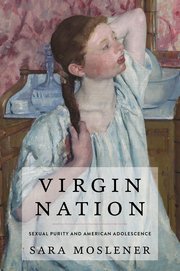Virgin Nation

September 2, 2015
 I review an interesting book today over at Books at a Glance. And if you are a member of their website, you can listen to the audio version of my review, read by me:
I review an interesting book today over at Books at a Glance. And if you are a member of their website, you can listen to the audio version of my review, read by me:I have two teenage daughters. Two! So purity is definitely a Christian value that my husband and I want to guard, promote, and teach on a continual basis. And yet between technology advancing further than we seem to be able to catch up with and the obsession with sexualizing everything in our culture these days, adolescence is difficult to navigate through. It almost seems like a trial for both parents and their children – who will survive?
Concerned and proactive parents appreciate all the help we can get. But perhaps we are too quick to give our encouragement and support. The parachurch purity movement has been one of those causes that may need a closer evaluation. Just because they use some of the same words and share many of our common concerns does not mean it is something Christians should wholeheartedly embrace. What if the very thing that appears to be helping our children is actually hindering their understanding of holiness?
While chastity is a Christian virtue that we should both model and teach, some evangelical parachurch movements have taken it out of its context of Christian holiness and the local church’s disciple-making commission. So a very good thing, Christian purity, has become a commodity instead of a process in sanctification.
Given my apprehensions about what is marketed to my teenagers both by the secular media and the evangelical parachurch movements, Sara Moslener’s new book, Virgin Nation: Sexual Purity and American Adolescence, piqued my interest. Moslener traces the sexual purity movement in America, showing how it developed as an ideology linked to national security. She identifies “several cooperating impulses: evangelical political activism, deep anxiety over gender roles and changing sexual mores, fear and moral decay, apocalyptic anticipation, and American nationalism”, making the case that “sex and national survival are the poles around which evangelicals have constructed a national identity” (5).
An evangelical reading this book may be tempted to write Moslener off from the start. How dare she go after something that is so sacred to us as sexual purity? But the research done in this book is something we should take a look at.
Read the rest of my review here.




